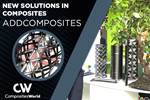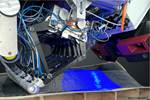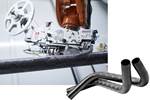IFW’s AFP installation enhances thermoplastic structure production
Commissioned AddComposites AFP manufacturing cells with humm3 flashlamps are located at IFW’s Stade and Garbsen facilities to expand R&D services.
Photo Credit: IFW at Leibniz University
As part of the PräziLight project, the (IFW) at Leibniz University (Hanover, Germany) is expanding its laser automated fiber placement (AFP) capabilities with the installation of AddComposites’ (Espoo, Finland) AFP system equipped with a Heraeus Noblelight (Gaithersburg, M.D., U.S.) humm3 Xenon flashlamp at the organization’s Stade and Garbsen facility.
IFW’s strategic expansion will enable the provision of practical R&D services to businesses, particularly in structural lightweight design and the production of complex components for aerospace, hydrogen and other industries using innovative material concepts such as thermoset and thermoplastic fiber-reinforced polymer (FRP) composite materials.
The IFW, particularly the Stade location, has dedicated extensive research efforts to explore AFP technologies over the past years. Its newly installed AFP system encompasses two innovative systems. One, at the Stade location, been augmented with an 8.5 × 6 × 4.5-meter laser protection cabin, complementing the existing experimental setup. This cabin houses a specially developed four-tow AFP system using a VCSEL diode laser from Trumpf (Ditzingen, Germany), operated on an industrial robot. This system can process a wide range of fiber-reinforced semi-finished products, from thermosets to high-performance thermoplastics (e.g., PEEK).
In addition, a second AFP system has been commissioned at the Garbsen location. Installed in the scale research building, this system features a horizontal positioner for producing rotationally symmetric components such as tanks, as well as a rotating-tilting table for fiber deposition on complex shapes. This system can realize components with a length of 2.6 meters and a diameter of 2 meters. Unlike the AFP system at the Stade location, the AddComposites AFP system in Garbsen is equipped with a Xenon flashlamp, eliminating the need for complex laser safety measures. The capability to process thermoset and thermoplastic semi-finished products remains.
In addition to the physical equipment, digital replicas of both systems are available, enabling simulation studies and offline programming before production begins.
The PräziLight project is funded by the State of Lower Saxony and the European Regional Development Fund (EFRE).
Related Content
-
The potential for thermoplastic composite nacelles
Collins Aerospace draws on global team, decades of experience to demonstrate large, curved AFP and welded structures for the next generation of aircraft.
-
Sulapac introduces Sulapac Flow 1.7 to replace PLA, ABS and PP in FDM, FGF
Available as filament and granules for extrusion, new wood composite matches properties yet is compostable, eliminates microplastics and reduces carbon footprint.
-
The next evolution in AFP
Automated fiber placement develops into more compact, flexible, modular and digitized systems with multi-material and process capabilities.






